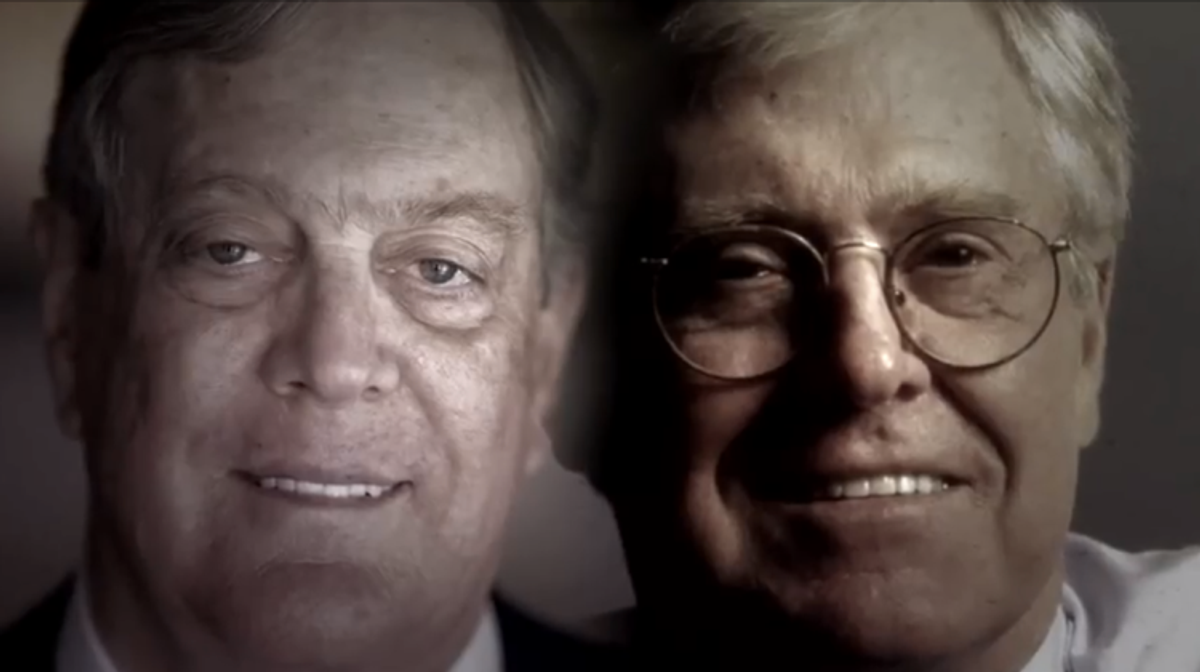Not one Wall Street executive was criminally charged following the 2008 global financial collapse, and if the Koch brothers and House Republicans have their way, it'll be harder to hold white collar criminals accountable for their future malfeasance.
In an age when even acts of terror fail to lessen the tense political divisions in Washington, D.C. a rare beacon of bipartisanship comprise has taken root among elected federal officials working on criminal justice reform. President Obama oversaw the release of thousands of low-level drug offenders from federal prison earlier this month and the Republican-controlled Senate Judiciary Committee passed a criminal justice reform bill last month reducing certain mandatory minimum prisons sentences. Still, hardly any Republicans caught fire or yelled of lawlessness and an impeding thug revolt. That's because conservatives have very recently been primed to lend a sympathetic ear to reforming the massive U.S. prison state by none other than the Koch brothers. Concerns of cost and efficacy have seemingly resonated with Republicans who have long ignored cries of institutional racism and predatory police practices.
The Kochs have made a significant public relations push to bolster their image as bold reformers, weaving talk of criminal justice reform with complaints of cronyism to create a false equivalence. Although activists have long warned that the billionaire brothers' push for criminal justice reform is actually a trojan horse to force massive deregulation to aid their business holdings, we now have some of the first firm evidence pointing to such a scam.
On Monday, House Republicans released their version of a criminal justice reform bill, the Criminal Code Improvement Act of 2015. As the Huffington Post reports, the bill "would make it more difficult for federal authorities to pursue executive wrongdoing, from financial fraud to environmental pollution."
A key provision of the bill lessens the level of culpability business executives who run afoul of white collar laws face. As the conservative Heritage Foundation, a big supporter of the Republican legislation along with the Koch Brothers, explains, white collar crimes hardly cause grave societal impact and thus shouldn't be classified as crimes at all. As Heritage suggests, the Republican reform bill reclassifies reckless, negligent or grossly negligent acts by corporations as no longer criminal. The Huffington Post explains:
While current law allows corporate crime prosecutions of high-level managers based on negligent or reckless behavior, the House legislation would require many such offenses to be "knowing" crimes, in which executives were explicitly aware of the activity being conducted by other employees. In some cases, prosecutors would also have to prove that the executives knew that the activity was illegal.
"There is a significant difference between regulations that carry civil or administrative penalties for violations and those that carry criminal penalties," Heritage argues on behalf of corporations found criminally liable for pollution or financial fraud. "People caught up in the latter may find themselves deprived of their liberty and stripped of their rights to vote, sit on a jury, and possess a firearm, among other penalties that simply do not apply when someone violates a regulation that carries only civil or administrative penalties."
In a statement to the Huffington Post, Department of Justice spokesman Peter Carr said the Koch brothers backed GOP criminal justice reform bill "would create confusion and needless litigation, and significantly weaken, often unintentionally, countless federal statutes," including "those that play an important role in protecting the public welfare ... protecting consumers from unsafe food and medicine."
The House GOP bill is set to be debated in the House Judiciary Committee this week, but it so far has been lauded as part of a larger bipartisan criminal justice effort.

Shares